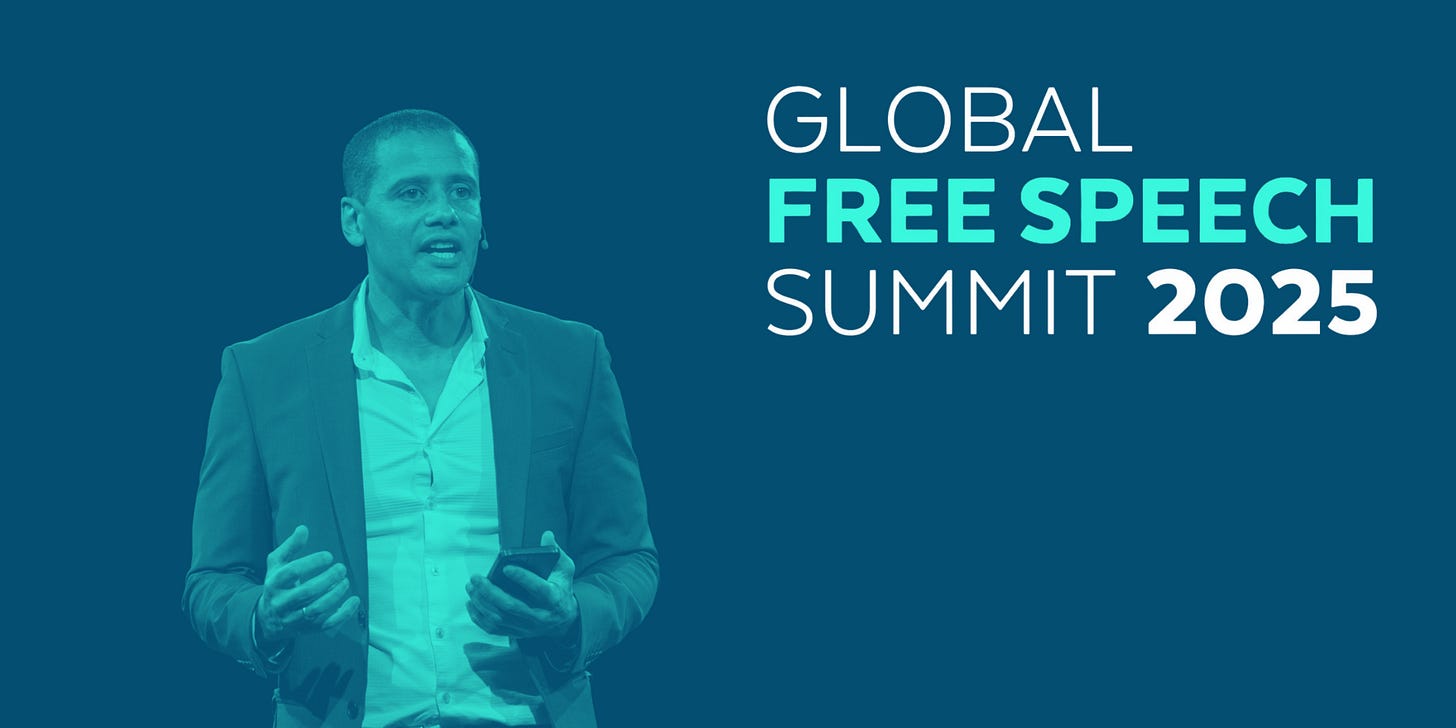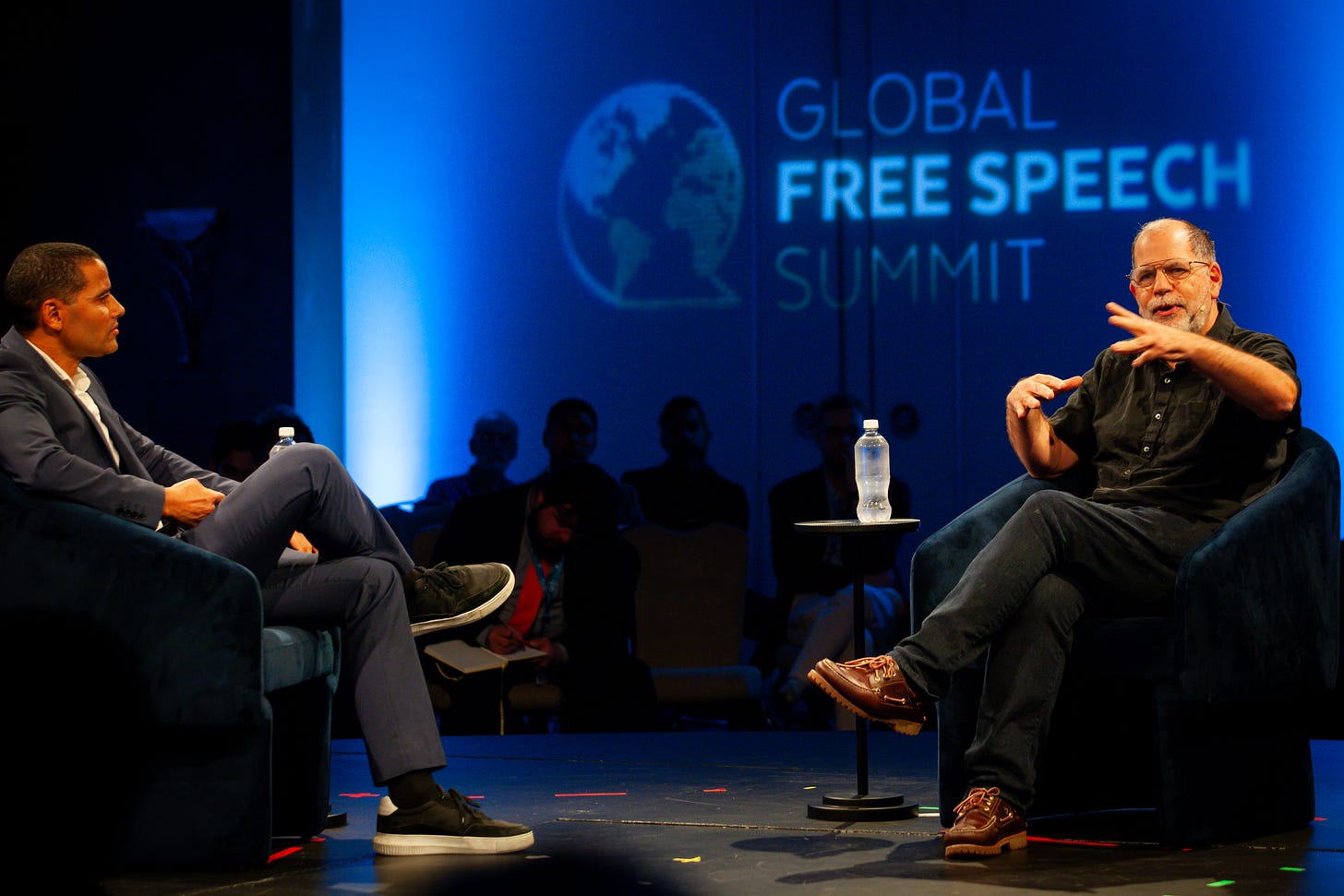My Opening Remarks from The 2025 Global Free Speech Summit
A weekend of bold ideas, fearless voices, and a shared belief that free expression remains the foundation of every free society.
Last weekend’s Global Free Speech Summit in Nashville was a powerful reminder of why this work matters. Over two days, we brought together dissidents, journalists, scholars, and technologists from around the world who are at the forefront of defending and expanding the space for free expression.
It was an honor to sit down with Tyler Cowen to discuss how artificial intelligence will shape the future of free speech—and how we can ensure that freedom of thought remains a core value in an age of algorithms. I also had the privilege of joining Yascha Mounk, Renée DiResta, and Jonathan Rauch for a live recording of The Good Fight podcast, where we explored the state of free speech under both the Biden and Trump administrations, as well as the new challenges facing open discourse on campuses. You can listen to that conversation here.
.The energy and insight shared by our speakers—from courageous dissidents and investigative journalists to policy experts and digital innovators—made this Summit our most inspiring yet. I would also like to extend my deepest thanks to everyone who joined us, as well as to our generous sponsors: FIRE, Freedom Forum, Heterodox Academy, and the Knight Foundation.
Looking ahead, I’m very much looking forward to the forthcoming publication of our new AI report that was presented at The Summit titled “That Violates My Policies: AI Laws, Chatbots, and the Future of Expression,” directed by me, Jordi Calvet-Bademunt, and Isabelle Anzabi. The report ranks eight major chatbots based on their “free-speech culture”—how open they are to lawful but potentially controversial discussions—and assesses six national AI regimes by their legal protections for expression.
Be sure to subscribe to The Future of Free Speech newsletter to stay updated when the report is released:
Without further ado, please find my opening remarks below and check out a teaser gallery of some of the highlights from the Summit. More photos and videos to come.
Opening Remarks
Good morning, everyone. I’m Jacob Mchangama, Executive Director of The Future of Free Speech.
It’s my great pleasure to welcome you to the second Annual Global Free Speech Summit. I want to thank you all for being here today and also to thank our sponsors who have made this event possible, first and foremost Vanderbilt University, but also our friends at FIRE, the Freedom Forum, Heterodox Academy, and the Knight Foundation. And I also want to thank my great team at The Future of Free Speech for their hard work in bringing all of us together this weekend.
I will keep this brief, but I'd like to tell you a little bit about why we’re here today. As you can maybe tell from my accent, I’m not from here. And as you probably guessed from my appearance, I’m from Scandinavia. Growing up in Denmark in the early 2000s, I rarely worried about my right to free speech. In this cozy haven of liberal and secular values, speaking freely felt as natural as breathing.
But twenty years ago this very week, that feeling changed.
On September 30, 2005, a Danish newspaper published cartoons depicting the Prophet Muhammad. No one fired bullets. No one dropped bombs. Artists just put ink on paper.
Yet those cartoons detonated a global firestorm that forced democracies to confront a searing question: Can free expression survive the “Fanatics’ Veto”? Where violent extremists impose rigid dogma through the barrel of a gun?
A decade ago, that veto struck with deadly precision in Paris. Gunmen stormed French magazine Charlie Hebdo’s offices, murdering twelve people, also for offensive cartoons.
Weeks later, lethal violence struck my hometown of Copenhagen. There, an attacker opened fire during a debate on blasphemy and free speech.
The Cartoon Crisis was formative for me—it’s one of the main reasons I’ve dedicated my professional life to advancing free speech. But it was just one tremor in a broader Free Speech Recession that has swept the world, crashing ashore even in democracy’s traditional bastions.
I could overwhelm you with statistics—record numbers of journalists imprisoned and killed, the proliferation of laws against “misinformation” and “extremism” that governments weaponize to monopolize power. And we will discuss censorship in AI, digital authoritarianism in China, European paternalism, and the assault on American free speech exceptionalism.
But this Summit isn’t only about cataloging threats. It’s also about building solutions.
Too often, the free speech movement’s response to new threats are slogans that seem abstract and theoretical to those who worry more about the harms of viral hatred and hoaxes than slippery slopes.
We need to shift from merely protecting speech to actively strengthening the culture and infrastructure that makes it thrive. And we must show—concretely—how free expression helps solve problems that many believe it has caused.
Over the next two days, you’ll hear about AI tools that can help update deliberative democracy for the digital age; Civil society groups organizing to defy authoritarianism; free speech organizations creating lasting impact and ways to create social media that empower users to take control of their feeds. You’ll hear how incredible courage can pierce the veil of gender apartheid in Afghanistan and so much more.
The common denominator? A belief that Free expression is the operating system for free and flourishing societies.
In this room, I see academics devoted to distilling the principles of open societies. Activists who’ve risked their freedom to challenge tyranny. Tech innovators building systems that reward true dialogue. Journalists who pursue truth in the darkest of places. Lawyers defending the defenseless. Students who will inherit this fight.
I know you disagree—passionately—about many things. Religion. Gaza. Immigration. But in an era of polarization, where zero-sum thinking corrodes principles, this room represents something precious: the recognition that free speech isn’t a luxury for those we agree with—it’s the foundation that allows us to disagree productively and settle our differences with words instead of violence.
You’re here because you understand that the answer to speech we hate isn’t silencing—it’s a digital-age renaissance of the Ancient Athenian ideals of free and equal speech. These principles constitute the most effective error-correcting mechanism humans have discovered. Not perfect. Often messy. But vastly superior to the top-down imposition of orthodoxy. That is why we’re here.
But we wouldn’t be here without the visionary support of Vanderbilt University. Two and a half years ago, I met with Chancellor Diermeier to discuss a bold idea: Could Nashville become a global hub for free expression? A space where diverse voices unite around shared principles?
Under his leadership, Vanderbilt has risen to 7th in FIRE’s campus free speech rankings—a testament to what’s possible when institutions commit to open inquiry not only on paper but in practice.
Ladies and gentlemen, please join me in welcoming someone who understands that universities must be laboratories for bold ideas, not echo chambers of conformity—Vanderbilt University Chancellor Daniel Diermeier.
A preview of some photos from the Summit:
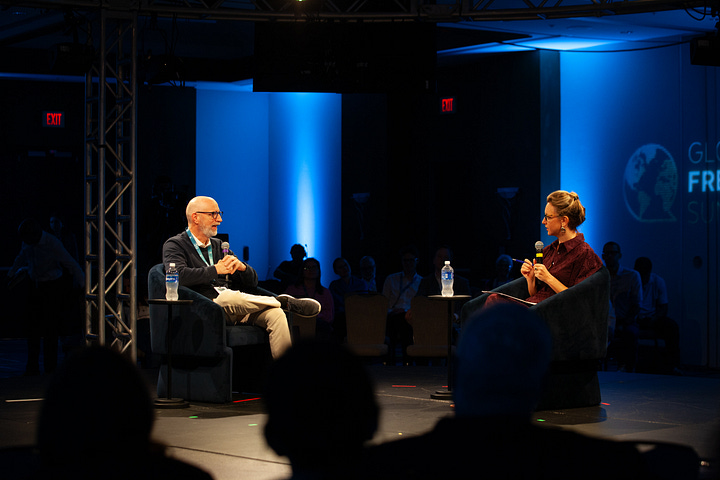
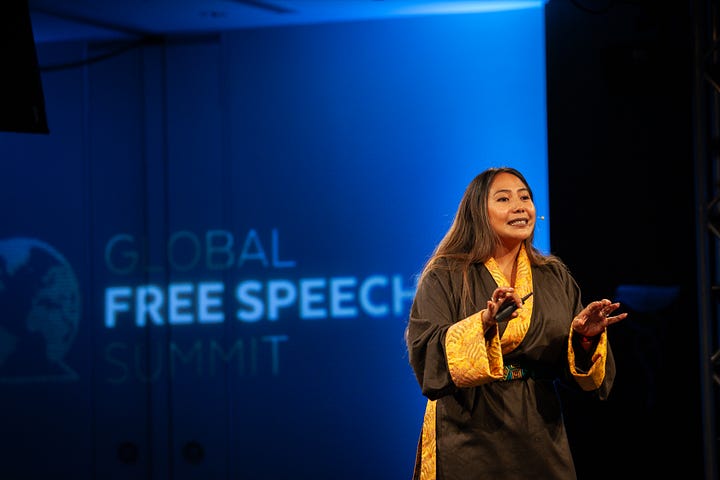
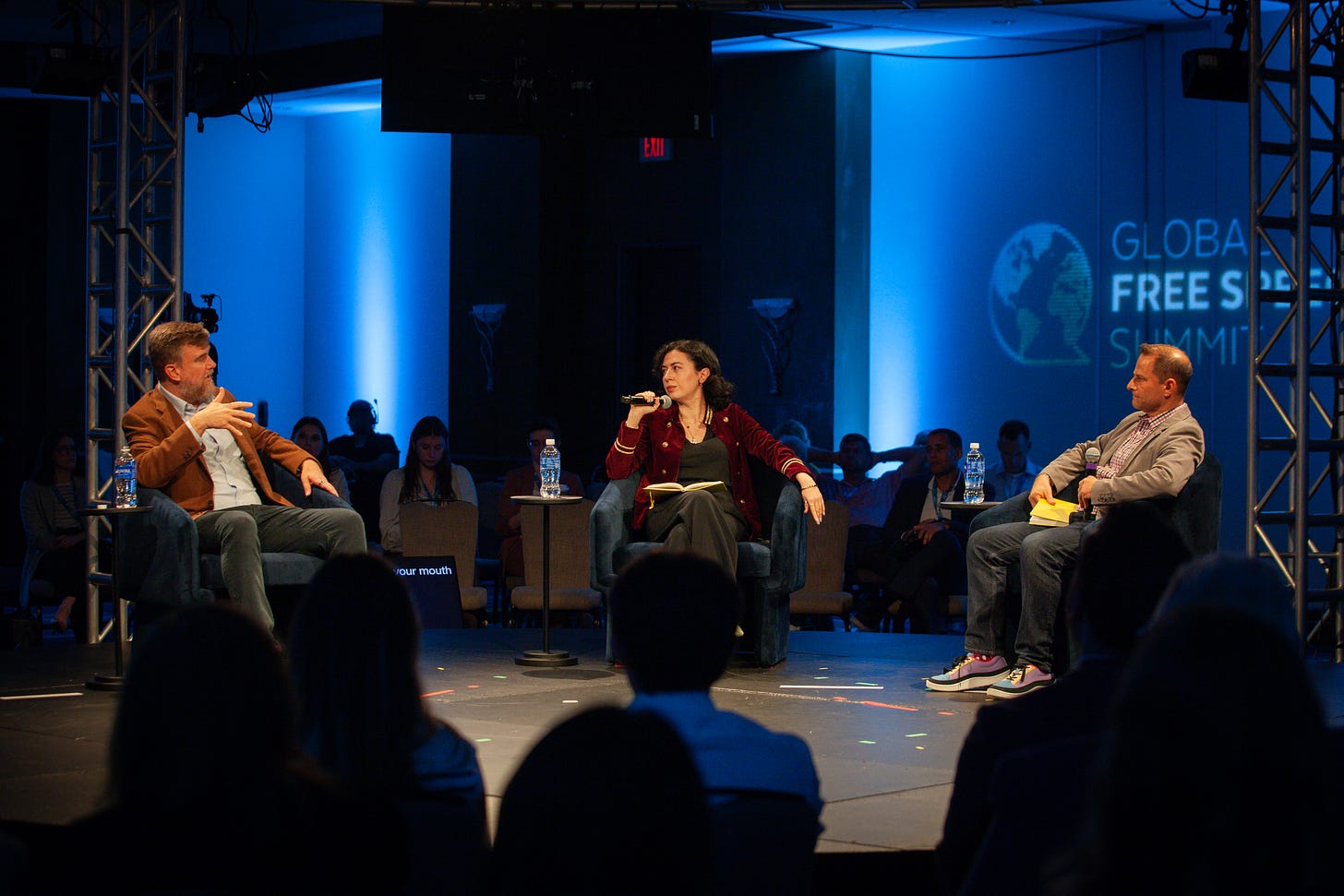
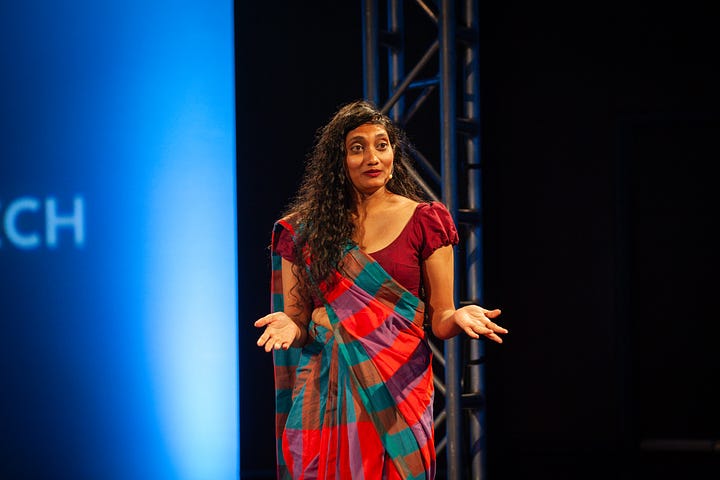

Jacob Mchangama is the Executive Director of The Future of Free Speech and a research professor at Vanderbilt University. He is also the author of Free Speech: A History From Socrates to Social Media.



